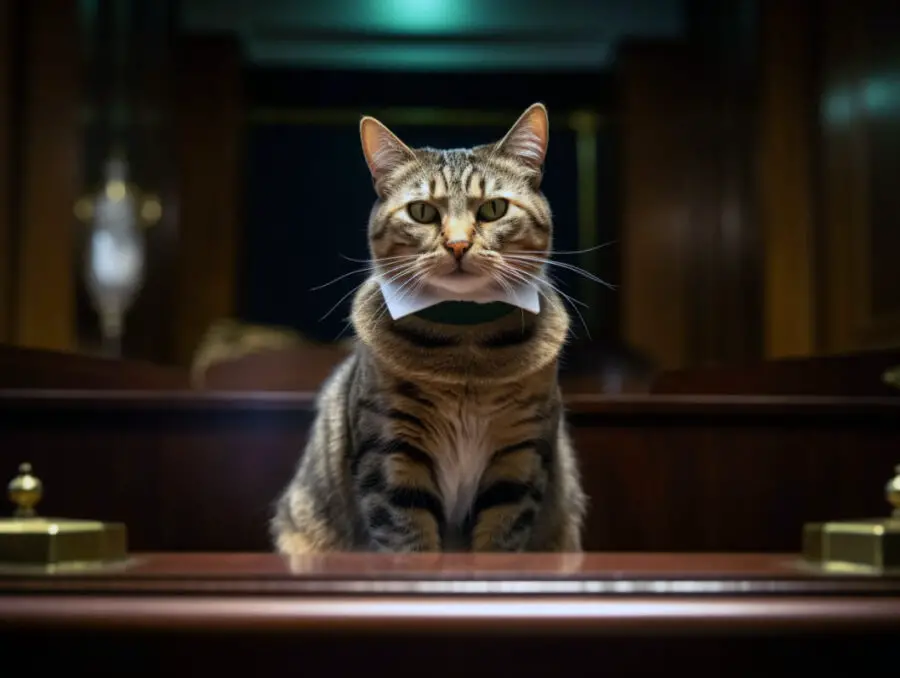Ever marveled at the diversity of cats that grace our homes and hearts, from the regal Maine Coon to the charming Siamese?
If so, brace yourself for a journey into the equally diverse world of cat laws.
These regulations, some quirky, some serious, mirror our evolving relationships with these enigmatic creatures and are bound to leave you astonished.
1. The Belgian Cat Rental Law: A Furry Odd Tale
In the quaint city of Liège, Belgium, you’re prohibited from renting out cats. This law, though amusing at first glance, highlights a serious issue. Historically, cats were “rented” for pest control and then abandoned, leading to issues of neglect and overpopulation. This law encourages more responsible pet ownership.
2. California’s Cat Declawing Law: A Clawful Surprise
In California, cat declawing is strictly forbidden unless it’s for medical reasons. This law protects cats from a painful and often unnecessary procedure, highlighting California’s commitment to animal welfare.
3. Cats and Curfews: The Nighttime Ban in Arcadia, Australia
In Arcadia, Australia, cats aren’t just household pets; they’re residents with curfews. To protect local wildlife, cats are prohibited from roaming outdoors between sunset and sunrise. Violation can lead to substantial fines, ensuring that our feline friends aren’t causing a ruckus in the dark.
4. Rome’s Cat Sanctuary Law: A Purrfectly Unique Approach
In Rome, cat sanctuaries are protected by law. The city’s most famous cat sanctuary, Torre Argentina, is home to hundreds of cats that are cared for by volunteers. This underscores the city’s respect for feline life and dedication to caring for stray and abandoned cats.
5. Cats in Condos: Singapore’s Strict Housing Rules
Singapore has stringent rules about pet ownership in public housing. Residents are only allowed to own certain breeds of cats, and these pets must be sterilized and not allowed to roam the corridors. This law aims to balance responsible pet ownership with maintaining a pleasant living environment for all residents.
6. ‘Katzen-Krawall’ in Germany: Noisy Cat Regulations
Germany takes a firm stance on noisy cats. In some regions, cats can be confiscated if their night-time yowling is too disruptive. This peculiar law showcases the extent to which noise control is taken seriously, even when it involves our furry friends.
7. Swiss Cat Welfare Laws: Two’s a Company, One’s Against the Law
Switzerland is famous for its stringent animal welfare laws, particularly those involving cats. It’s illegal to own just one cat in this country, as they’re considered social animals and must have a companion. This law reflects the Swiss commitment to ensuring animal happiness and welfare.
8. The United Kingdom’s Peculiar Cat Licensing Laws
In the UK, if you own more than five cats, you might be required to obtain a cattery license. This law, while seeming excessive, ensures that multiple cat owners provide appropriate living conditions for their pets.
9. Japan’s Cat Cafe Regulations: A Unique Twist to Dining Laws
In Japan, cat cafes are a popular phenomenon. However, they’re governed by strict regulations. Cats must have regular health checks and be given sufficient rest periods away from customers. This law safeguards the well-being of these cafe cats, ensuring they’re not just a cute gimmick but also treated humanely.
10. From Tabby to Tuxedo: Unbelievable Breed-Specific Laws
Certain jurisdictions have surprising laws tied to specific cat breeds. For example, in some parts of the United States, ownership of hybrid breeds, like the Savannah cat, is strictly regulated due to their wild ancestry.
As intriguing as it is to own a hybrid cat breed like a Savannah, the laws governing the ownership of these fascinating felines are equally intriguing. Certain jurisdictions in the United States and around the world have strict regulations regarding the ownership of specific cat breeds, particularly hybrids, because of their wild ancestry.
The Savannah cat, for instance, is a cross between a domestic cat and a serval – a wild African cat. The result? An incredibly beautiful and exotic-looking feline with spots like a leopard and the size of a small dog. However, their beauty comes with a catch.
Savannah cats are subject to specific laws or outright bans in many jurisdictions across the United States. This is because the Savannah cat, especially in its first few generations, retains much of its wild heritage. They are larger, more active, and require more space than the average house cat. Their hunting instincts are also much stronger.
New York City, for instance, has strict rules against owning a Savannah cat. Other places categorize them as “dangerous animals,” making it mandatory for owners to have a permit. Some states, like Georgia and Nebraska, have laws based on the generation of the Savannah. While F1 (first-generation hybrid) and sometimes F2 Savannah cats are typically banned due to their higher percentage of wild DNA, later generations with a lesser degree of wild ancestry are often permitted.
Similarly, in Australia, the importation of Savannah cats is completely banned due to concerns about them becoming invasive if they escape or be released into the wild.
These laws are put in place to ensure that potential owners can provide the proper care that these semi-wild cats require and prevent potential damage to local ecosystems. However, it also means that if you are attracted by the allure of owning an exotic cat like the Savannah, you’ll need to do careful legal research before bringing one of these stunning creatures into your home.
11. Litigation or Litter-ation: Legalities of Cat Litter Worldwide
Several places, like the city of Cupertino in California, enforce laws around the proper disposal of cat litter, which can be harmful if not disposed of responsibly. This law is an important step towards environmental conservation.
12. Cat Laws in War: Felines on the Front Lines
Historically, cats were used in warfare, primarily as rat catchers on naval ships. Some laws still reflect this, such as the U.K.’s Royal Navy having regulations regarding the treatment of ship cats.
13. Cats and Cuisine: Unbelievable Food Laws Involving Cats
In many places, laws explicitly prohibit the use of cats in cuisine to protect these animals from inhumane treatment and to safeguard public health.
14. Leash Laws and Cats: An Unexpected Combination
You’d expect dogs to be leashed, but cats? In Mount Isa, Australia, a law requires cats to be on a leash in public areas, highlighting the lengths some places go to ensure harmony between pets, wildlife, and humans.
Conclusion: A World of Purr-plexing Laws
From laws ensuring the social well-being of cats in Switzerland to curfews in Australia, our journey through the labyrinth of global cat laws has been nothing short of fascinating.
Our love for these feline creatures and the complexities of human society has led to a world brimming with perplexing laws!
Laws to Ban Cat Declawing (Video)
"In ancient times cats were worshipped as gods; they have not forgotten this."
-- Terry Pratchett





